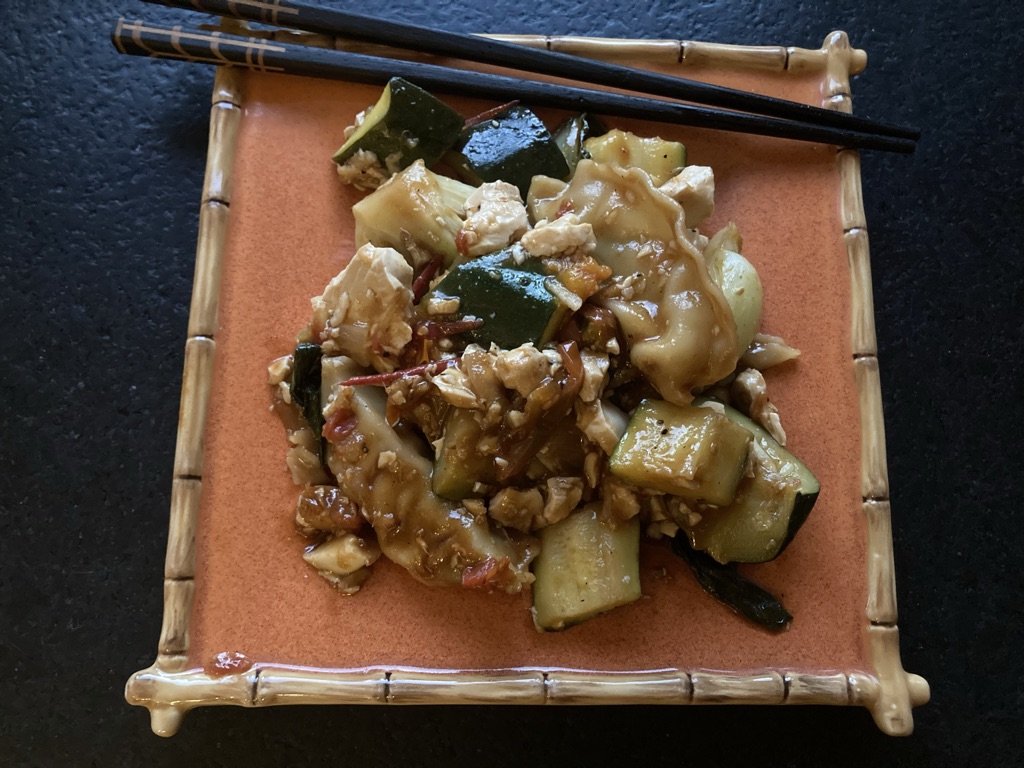
“It has to be done, so it might as well be done by me,” I told myself as I dumped the thawed package of supermarket potstickers into the vegetable stir-fry. I may be crazy, but it’s a lock that my kids will like it. So how crazy could that be?
Trying to make a stir-fry can get a home cook into trouble. It might seem like a simple kind of recipe until you try to make it and the eggplant is chewy, the broccoli is mushy, and it doesn’t taste the same as it does at the Chinese restaurant. Instead, it tastes like burnt soy sauce and perhaps balsamic or cider vinegar, because you didn’t have rice vinegar or sherry and figured that would be fine.
re are so many mistakes to be made, several of which seem to be good ideas at the time. I’ve made them all, many times—sometimes all at once. Adding potstickers to my stir-fry seemed to be a good idea at the time and remains, by all accounts, a good idea and not a stir-fry mistake.
Many stir-fry mistakes start with the intention to make it in the first place. Why are we doing this? If we’re making stir-fry as a way to clean out the fridge on a Friday night because the next day is farmers market day, that’s not enough of a reason.
Executed properly, a stir-fry can be a celebration of fresh produce, not a waypoint between the back of the fridge and the compost pile. It should be a stage for the bright colors and crisp textures of the season.
But as with any stage, too many actors can lead to them getting in each other’s way. Another common mistake is to get too busy with your stir-fry. Even if each and every veggie is the freshest specimen under the sun, you don’t want to use them all. A stir-fry requires restraint. It isn’t some complex ecosystem that depends on diversity. Choose one or two veggies and let them be the main event: A star, balanced with a co-star and perhaps a supporting protein or two, bound together by a sauce that tastes like a stir-fry is supposed to—how it tastes in a Chinese restaurant.
Here are the other most common stir-fry mistakes, based on my extensive personal research.
Not Hot Enough
High heat is necessary for imbuing the contents of the wok with a smokey glow called wok hei, which translates to “breath of the wok.”
Not Wok Enough
It isn’t heavy enough, that is. A light wok will lose its heat when stuff is added.
Not Blanched Enough
Use water, not steam. If we don’t blanch, we burn our aromatics.
Cooking Too Much at a Time
An overfilled wok means the veggies don’t all get the time they need against the hot wok, in the hot oil. In fact, adding too much stuff can cool down the wok, killing that wok hei buzz.
Cooking in Sesame Oil
Sesame oil—toasted sesame oil, I should emphasize—is for flavoring, not for cooking. Fry with a heat-tolerant oil such as safflower, peanut, or frying blend.
Not Enough Oil
In those times of calorie counting, it can be tempting to pull back on the fry oil. But then your wok won’t get hei, and that’s no fun.
Adding Sauce Early
Have you ever burnt soy sauce? I have. It smells and tastes bad, and makes the pan hard to clean. Any soy and soy-like sauces should be added toward the end of cooking to coat the food, but not cook with the food.
other day, I made a stir-fry with cauliflower and zucchini. I decided to add tomatoes to the sauce, so their savory flavor can mix with the soy sauce, oyster sauce, and sesame oil, increasing that umami impact. Since I was too lazy to make rice, I decided to just add some potstickers to the wok. y went perfectly with the crumbled tofu tomato stir-fry sauce.

Potsticker and Vegetable Stir-Fry With Tomato Tofu Sauce
tofu crumbles into the savory sauce, which drenches all that it touches in a silken tapestry of flavor.
For the Sauce
- 4 tablespoons oyster sauce
- 2 tablespoons sesame oil
- 2 tablespoons rice wine
- 1 tablespoon sugar
- 1 tablespoon sesame seeds
- 1 tablespoon hoisin sauce
- 1 teaspoon ground black pepper
- 1/2 cup water
- A clove of garlic, grated
- A garlic clove-sized piece of ginger, grated
- 1 block silken, firm tofu, pulled into 1-inch chunks
For the Stir-Fry
- 1 pound cauliflower, cut into 2-inch florets
- 2 zucchini, cut into 1/2-inch rounds
- 2 heads baby bok choy, quartered lengthwise
- 3 tablespoons frying oil
- 1 tablespoon minced garlic
- 1 tablespoon minced ginger
- 1/2 cup minced onions
- 1 pound fresh, juicy tomatoes, chopped coarsely
- 10 frozen potstickers (Asian dumplings), thawed
Make the sauce: Combine all of the ingredients except the tofu and mix thoroughly. Add the tofu, stir it in, and let sit for at least an hour.
Make the stir-fry: Boil a pot of water in which to blanch the vegetables. Add them to the pot in order of longer cooking time: First the cauliflower. After 3 minutes, add the zucchini. After another minute, add the bok choy. Give it 30 seconds, boiling, and then remove all of the blanched veggies and plunge them in an ice bath. This will stop the cooking and keep the veggies crisp and brightly colored. When the veggies are cool, drain them.
Heat the oil on high in a wok or heavy-bottomed pan. Add the garlic, ginger, and onions. Let them fry for 1 to 2 minutes in the sizzling oil. Add the tomatoes and let it cook into a sauce for about 5 minutes, stirring often.
Add the veggies and stir-fry! After about 5 minutes, add the marinated tofu and all the marinade. Add the potstickers. Stir. Taste. Season with any of the ingredients from the marinade.
Drain the excess sauce from the wok by tilting it over a pan and holding back the contents. Put the sauce on medium heat to thicken, set the wok back on high, and continue cooking. More moisture will seep from the stir-fry. Stop stirring and let the moisture cook off. When it’s nearly gone, turn off the heat. Add the reduced sauce back to the stir-fry, mix again, and serve.
Pezou : Don’t Make se Stir-fry Mistakes